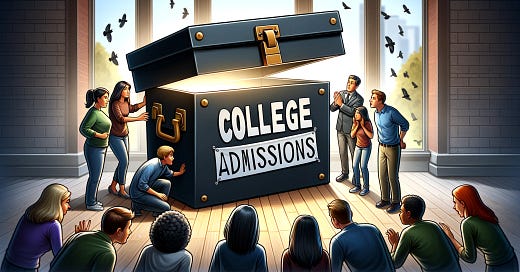The black box of college admissions often results in frayed feelings and fractured relationships
Parents and students look for answers in all of the wrong places.
A huge downside of how competitive colleges have become is that it often pits kids—and parents—who were formerly friends against one another. I saw this firsthand last fall when an acquaintance, whose daughter was applying to a top 10 public university, questioned why his daughter’s friend was admitted but his daughter was not.
“My daughter’s grades and extracurriculars and essays blew this kid out the water. I know for a fact. There cannot be a good reason why my daughter wasn’t admitted and her friend was not. Maybe…diversity? But that doesn’t seem fair.”
And there you have it folks: There is no plausible reason, according to this parent, why his kid was denied admission and her friend was not outside of well, maybe, diversity. I call BS.
What my digging has uncovered.
First, full disclosure: I’ve been conducting research for a book on how to help kids be successful in and after college. It’ll focus on the all-important things kids need to do, including select the right school, choose a major suited to their skill set and interests, engage mentors, engage in experiential learning, find internships, etc. I’ve been fortunate enough to interview professors, assistant professors, and current and former admissions folks at top schools from across the country. I’ve also read more than a dozen books on the topic, in addition to blogs, research reports, and sundry studies on the topic.
This research has given me great insight into the black box of college admissions. The No. 1 thing I’ve learned? Admission or denial of admission cannot be reduced to monocausal explanations. There are so many excellent students applying to colleges today that the best schools could literally fill a class via blindly pulling names out of a hat. In fact, not long ago, the head of admissions for one of the Ivies was asked what percentage of the more than 20,000 students who applied to his school were qualified applicants.
“Eighteen thousand,” he said. This meant that less than 1,000 applicants didn’t make the cut. (They admitted 2,000 students annually.) This is on par with happenings at other top public and private universities across the country, many of which now have acceptance rates in the teens or lower.
Jeff Selingo, author of the must read Who Gets In and Why: A Year Inside College Admissions, has talked and written extensively about this in relation to how many top students cannot possibly fathom being denied acceptance at a top school but fail to realize how many top students there are nationwide vying for the same spots.
“You, in your local context, might say, ‘I’m ranked number 5 in my class. I have this high GPA or this high SAT score. I’m captain of this team or president of that club…’ Then you replicate that across not only the U.S. but also the world. It’s…such a deep pool [of applicants].”
Remember, there are more than 40,000 high schools in the United States. That’s 80,000 valedictorians and salutatorians.
Parents exacerbate the challenge
It’s understandably tough for kids to get their heads around being denied acceptance to the college of their dreams, but where things go off course in the worst fashion is when parents get involved. It’s not unheard of for parents to talk online or in person about how unfair the system is to their child. A recent example comes to mind.
The mother of a young man who was not accepted at the University of Texas at Austin for Computer Science inquired, amongst a group of parents, “I’d like to know how his friend was accepted with a GPA nearly 100 points lower and having taken only four AP classes? My son had taken nine.”
Unfortunately for this parent, she made the mistake of saying this within earshot of my ears. It was a softball too easy to let slide.
“I cannot say why, definitively, but I can provide some justification that likely played out during the admissions process. First, your son’s friend was accepted into a program that is literally 10 times larger than the one for which your son applied. The average GPA for that program, as self-reported by current and former students via an anonymized Excel document shared on Reddit, is in the mid-1,300s and has an acceptance rate of roughly 20%.”
“Computer Science, which is not only the single hottest program at schools nationwide, by a wide margin, it is the most competitive program at the school for which he applied. The information shared in a similar Excel document on Reddit shows that nearly 25% of the students admitted to the CS program were either valedictorians or salutatorians and the average SAT score for those admitted was ~1,500. What’s more, the program, because of its limited size, denied numerous students with SAT’s north or 1,500. In fact, an acquaintance whose son scored a 1,510 on the SAT and a 35 on the ACT was denied for the program.”
“So, to look askance at your son’s friend for being accepted is like comparing apples to oranges. They were never pitted against one another. The way to look at it is not that ‘My son was far more competitive for acceptance than his friend, so he should been admitted’; the way to look at it is ‘My son lost out to more competitive applicants for his major.’”
She wasn’t happy, but she could count herself well-informed.




